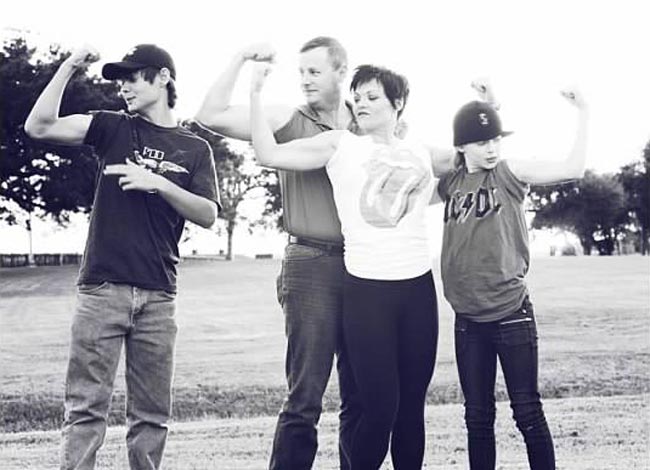While I’m enjoying some much needed R&R, I have a wonderful guest post from a friend I made at IDEA World Fitness. Michelle Carlson is a personal training with her own amazing fitness success story. She travels the world helping women who have been victims of human trafficking and helps kids at home through the Nike Safe Spaces program. Her work with kids (plus having a couple of her own) made her the perfect person to share how WE can help stem the tide of childhood obesity in American.
There seems to be an alarming trend among our youth today. No, I’m not talking about your typical teenage angst; I’m talking about the obesity epidemic that is plaguing our future as we speak. An alarming 2008 study released by the Center for Disease Control stated that 26.5% of our youth were obese. This is in conjunction with the 40% that are overweight. I hope that 100% of us will show our concern at the rise in this epidemic. Youth obesity didn’t come onto the scene overnight. Its rise has been steady for the past decade or so. More doctors have reported an overabundance of overweight and obese children presenting with obesity related diseases. Children as young as 4 years old have been diagnosed with Type 2 Diabetes and placed on insulin therapy. Many are prone to ask the question “How did this happen?” Often we sit in amazement at what is going on around us and blame the fast food industry, the parents, or both. The facts are much clearer than that though. With the 2008 release of the aforementioned study came the startling CDC report that this very generation will be the first generation to NOT outlive their parents. I think the bigger question to ask is, “How can I help?”
It is my firm belief that information is power. You can do a lot just by delving into the information system to find what you need to be of help. I MUST relate a fact that parents need to understand: If your child is overweight or obese, it is NOT your fault. It is your responsibility to seek the proper help and guidance for your family though. I’ll repeat. IT IS NOT YOUR FAULT. I see far too many parents come through my practice that are overcome by the shame of what they have allowed to happen and they cannot even find the energy to seek out proper assistance. Fault is not an issue here.
Let’s take a look at how obesity occurs. The body will store energy (calories) as fat any time that more is taken in than is needed at that time. The storage system is to be used later. I’m pretty sure we can all say we don’t go without food, so the storage system continues to grow unless the body is forced to use some of the stored calories (exercise). This process is more intense and takes longer than simply digesting a meal. So, the more calories we take in at any given time, the more we store in our fat storage system. Pile on top of that the fact that a lot of the calories offered to our youth are empty, meaning they provide little to no useable nutrition, and the storage facility really starts to get backed up. Think of it this way: which will give you more useable energy? A Cheeto? Or and apple? Now, which will most youth reach for first? Yeah, we’re getting it now. OK, so pile onto that the fact that most youth live sedentary lifestyles. This sounds so harsh, I know, but it is true. Compared to 30-40 years ago, the youth of today are nearly motionless. Video games, television shows, internet, etc have taken up the vital hours of movement that our children desperately need for their survival.
So, this all seems pretty cut and dry right? The youth of today eat too much, eat the wrong things, and don’t move enough. The bigger problem is that it is not that simple. For starters, many youth today are not learning proper respect and care for their bodies. We live in a fast society. We want it all and we want it yesterday. Due to this fact many parents don’t even have a proper respect for their own bodies. They ignore the signals that they need more rest until their body shuts down with an illness. Children pick up on this disrespect at a very early stage in life. If mom and dad don’t move (or just drop junior at the gym day care so they can get some “me time”) then kids don’t learn to appreciate movement either.
Another factor that seems to build up against us is the alarming rate of depression in youth. Due to overwhelming stress in school, a need to be “perfect”, stress at home, and even stress about one’s appearance, many kids are turning to drowning their sorrow in the nearest thing: food. Let’s face it, food tastes good. Even though you know it doesn’t give you love, that bowl of ice cream sure does taste good! Children are no different. How many of us parents have soothed a bo bo with a chocolate chip cookie or trip to the ice cream shop? I’m totally raising my hands here. Treats are fine, but we must practice awareness and model this awareness for our children.
So, enough with all the bad right? Sometimes it can be a downer when you hear all the statistics, but it enables us to take a stand. The next part of this article will focus on the question that is probably at the forefront of your mind by now: “How can I help?”As parents and caregivers, it is important to understand that we are NOT to nitpick or nag our youth into nutritional submission. Most of the families that come through my practice make this mistake first and it causes months, sometimes years, of detriment that must then be healed. This is not to say that we have greasy pizza every night for dinner, but salads usually just won’t do. Our youth are honestly just like us, they want to know the why. If you don’t have the information they seek, find a professional that will help. In light of this epidemic, many nutritionists are offering free or low cost classes that allow parents and children to learn the basics of solid nutrition. Most of the time, that’s all it takes is to reset the family foundation.
- Allow your child to be involved in the decision making process for facilitating changes. If your child loves pizza, consider having a weekly “pizza and movie night” to help foster better relationships and more positive thinking towards food. You would be astonished at how all too often they really do want the time with you and that will help in the portion control of the food. Foster involvement by allowing them to pick some of the meals and menu items for the week. If they have a favorite food, incorporate it into the family meals. This helps them to realize that food is simply food. It is neither good nor bad for you, but rather it is meant to nourish you.
- Do some research on the types of foods your youth generally eat. If it is a fast food addiction (I use that term lightly) then it was probably bread out of the need to socialize. Most teens either spend time at or work at the common fast food places, so they become a place to meet up. Research your teens favorite haunts and gently share information in a non judgmental way. You may be surprised that a lot of fast food chains are working towards offering healthier fare.
- It is important NOT to point out weight as an issue. When I work with clients, I make sure to state that their health is of utmost importance, as weight is just a number on the scale. I know this seems odd in the fight against obesity, but hear me out on this one. If all you are told is that you must lose weight, you begin to attach your self worth to that fact: weight loss. This creates a breeding ground depression and even opens the door to other eating disorders. HEALTH, not weight, is the key component to adherence to the program. Parents and caregivers should act as a safe place to confide in, and not the “food police” or the food enablers.
- If your youth is suffering from excess weight issues that show signs of inhibiting optimal health. Strongly consider seeking the guidance of a professional. There are many nutrition counselors, dieticians and eating disorder specialist that are available. When it comes to these sensitive issues, it is best to seek help as early as you notice a problem beginning. This will aide in assuring that both you and your teen get the pertinent information and well guided support you need before strong habits are formed.
- Finally, just a little extra movement can go a long way in increasing your youth’s health and maintaining a healthy weight as well as boosting a healthy self esteem. Consider starting small in the beginning. Start with family walks around you neighborhood. If you happen to live close to a park, walk down to it then challenge your youth to find creative ways to work their muscles on the equipment. You can do pushups and step ups on park benches, chin ups on the monkey bars, and even hops over the steps. The possibilities are endless and it’s important to allow some silliness into your life. Also remember that not every youth thrives in competition sports. You may want a football player, but he may like dance more. Baseball may be your dream, but he likes martial arts. She may enjoy trail hiking as opposed to tennis. Allow yourself and your youth to think outside of the box when it comes to fitness.
Always allow creativity to come into play for both exercise and nutrition. Be prepared to take your time and enjoy this process. Your youth and your family can have vibrant health and an even stronger relationship with these simple guidelines in place.
For more on healthy living, nutrition, and goal setting visit my blog at www.michellecfitness.com




